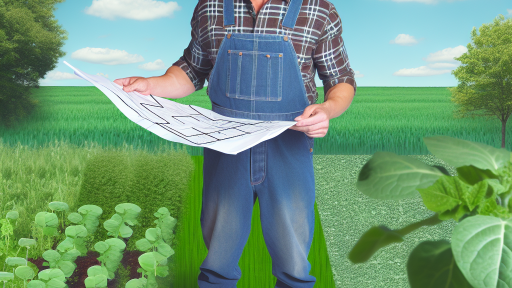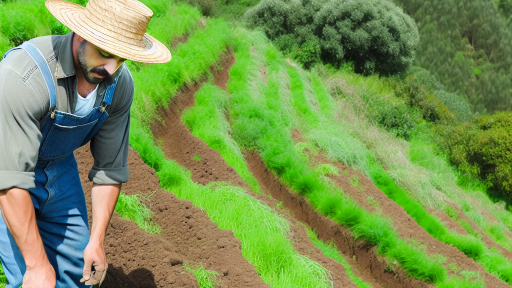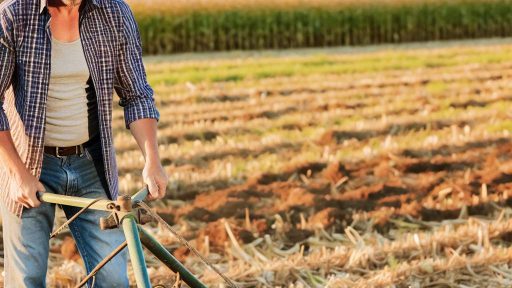Introduction to Organic Waste and Its Impact on Farming
Organic waste significantly affects farming practices today.
Farmers face increasing challenges managing waste effectively.
This waste can come from various sources including crop residues and livestock manure.
Consequently, understanding organic waste is crucial for modern agriculture.
Defining Organic Waste
Organic waste refers to biodegradable materials derived from living organisms.
Examples include food scraps, yard clippings, and animal waste.
Farmers often overlook the potential benefits of reusing this organic matter.
Environmental Implications
Improper waste disposal poses serious environmental risks.
It can lead to soil degradation and water contamination.
Moreover, organic waste can contribute to greenhouse gas emissions.
Thus, managing this waste responsibly is essential for sustainability.
Economic Considerations
Managing organic waste effectively can save costs for farmers.
It reduces the need for chemical fertilizers and enhances soil quality.
This approach can lead to improved crop yields over time.
Innovative waste solutions can support better farm profitability.
Transform Your Agribusiness
Unlock your farm's potential with expert advice tailored to your needs. Get actionable steps that drive real results.
Get StartedCommunity Health and Well-being
Efficient organic waste management contributes to community health.
It reduces pollution and promotes cleaner environments.
Additionally, it supports local food systems by recycling nutrients.
Healthy communities rely on sustainable agricultural practices.
Types of Organic Waste Generated by Modern Farmers
Agricultural Residue
Agricultural residue includes crop leftovers after harvest.
These residues often consist of straw, stalks, and leaves.
Farmers can compost these materials for soil enrichment.
Composting enhances nutrient cycling and reduces waste volume.
Animal Manure
Animal manure is a significant type of organic waste.
Dairy, poultry, and livestock farms generate substantial amounts.
Properly managed manure can be an excellent fertilizer.
It contains essential nutrients like nitrogen and phosphorus.
Food Waste
Food waste arises from both crop production and processing.
Surplus produce and spoiled food contribute to this waste.
Farmers can repurpose food waste into animal feed.
Alternatively, they can transform it into organic compost.
Cover Crops
Farmers often plant cover crops to improve soil health.
After the growing season, these crops produce significant biomass.
They can be tilled into the soil to enhance fertility.
This practice also helps prevent soil erosion and improves water retention.
Garden Waste
Garden waste is another common source of organic material.
Pruned branches, leaves, and dead plants often accumulate.
Farmers can compost this waste for additional organic matter.
This compost can then be used in garden beds or fields.
Showcase Your Farming Business
Publish your professional farming services profile on our blog for a one-time fee of $200 and reach a dedicated audience of farmers and agribusiness owners.
Publish Your ProfileOrganic Pesticides and Fertilizers
Residues from organic pesticides contribute to organic waste.
Used organic fertilizers can also create waste streams.
Farmers should handle these materials according to regulations.
Responsible management minimizes environmental impacts.
Benefits of Recycling Organic Waste in Agriculture
Enhancing Soil Health
Recycling organic waste improves soil fertility significantly.
It returns essential nutrients back to the soil.
Moreover, it enhances soil structure and water retention.
This practice encourages beneficial microbial activity.
Reducing Agricultural Waste
Farmers can cut down on organic waste disposal costs.
By recycling, they minimize landfill contributions effectively.
This approach decreases greenhouse gas emissions.
In turn, it supports a more sustainable farming ecosystem.
Increasing Crop Yields
Healthy soil leads to higher crop productivity.
Recycling organic materials promotes better plant growth.
Enhanced nutrient availability also boosts harvest quality.
Consequently, farmers achieve better economic returns.
Supporting Environmental Sustainability
Organic waste recycling significantly lowers environmental impact.
It reduces reliance on synthetic fertilizers.
Furthermore, this practice conserves natural resources.
Farmers contribute to a circular economy through recycling.
Encouraging Biodiversity
Incorporating organic waste fosters a diverse agricultural ecosystem.
It attracts beneficial insects and microorganisms.
Biodiverse environments enhance pest and disease resistance.
This aspect leads to healthier farms and ecosystems.
Delve into the Subject: Drip Irrigation Methods for Sustainable Farming
Innovative Technologies for Organic Waste Management
Introduction to Organic Waste Solutions
Organic waste management is vital for sustainable farming practices.
Farmers face challenges in efficiently handling organic waste.
Innovative technologies can enhance waste management processes.
Microbial Digestion Systems
Microbial digestion systems utilize bacteria to break down organic matter.
This process converts waste into biogas and nutrient-rich digestate.
Biogas can be used for energy generation, reducing dependence on fossil fuels.
Farmers like Anna Caldwell have experienced increased energy independence.
Composting Technologies
Advanced composting systems enable efficient organic waste processing.
These technologies promote fast decomposition through optimal conditions.
High-temperature composters significantly reduce disease-causing pathogens.
Farmers can produce high-quality compost for soil health improvement.
Success stories like Green Earth Composting highlight the benefits.
Aerobic and Anaerobic Digestion
Aerobic digestion involves oxygen-rich environments for breaking down waste.
This technology dramatically reduces the volume of organic materials.
Conversely, anaerobic digestion occurs in oxygen-starved settings.
Showcase Your Farming Business
Publish your professional farming services profile on our blog for a one-time fee of $200 and reach a dedicated audience of farmers and agribusiness owners.
Publish Your ProfileBoth approaches yield valuable products for farmers, such as fertilizers.
Farmers can improve soil fertility while managing waste efficiently.
Smart Waste Management Systems
Smart technology optimizes waste management with data analytics.
Farmers can monitor waste levels and processing efficiency remotely.
This level of oversight enhances decision-making and resource allocation.
Companies such as EcoTrack offer innovative management software solutions.
Utilizing Drones for Waste Monitoring
Drones streamline waste monitoring across vast farm landscapes.
These aerial devices capture real-time images for better assessment.
Farmers can identify waste accumulation hotspots promptly.
By acting quickly, they can implement timely waste management strategies.
Impact on Agricultural Sustainability
Innovative waste solutions foster sustainable farming practices.
They minimize environmental impact while maximizing productivity.
Farmers who adopt these technologies contribute to a circular economy.
Moreover, they help combat climate change by reducing greenhouse gas emissions.
Looking Ahead
The future of organic waste management holds great promise.
Continued innovation will drive further improvements in efficiency.
Farmers can expect ongoing advancements that support their needs.
As technology evolves, so will the methods for managing organic waste.
Uncover the Details: Maximizing Carbon Storage on Agricultural Lands
Case Studies of Successful Organic Waste Solutions
Introduction to Innovative Practices
Farmers increasingly seek sustainable methods for managing organic waste.
These practices enhance productivity and minimize environmental impacts.
This section highlights successful case studies from various regions.
Composting Initiatives in New York
Green Valley Farms in upstate New York leads innovative composting efforts.
The farm incorporates kitchen scraps and farm residues into their composting process.
As a result, they produce high-quality compost for their crops.
This initiative has reduced waste disposal costs significantly.
Moreover, it enhances soil health and promotes plant growth.
Farm Anaerobic Digesters in California
Sunny Fields Dairy in California uses anaerobic digesters efficiently.
These systems convert cow manure into biogas and nutrient-rich fertilizer.
Consequently, the farm supplies power back to the grid.
This approach decreases reliance on fossil fuels and lowers greenhouse gas emissions.
Innovative Use of Food Waste in Texas
Urban Harvest Gardens in Texas creatively utilizes food waste.
They collect organic waste from local restaurants and grocery stores.
This material enriches their community gardens, providing fresh produce.
Additionally, it fosters local engagement and awareness about sustainability.
Mushroom Cultivation in the Pacific Northwest
Forest Grown Mushrooms in Oregon showcases a unique organic waste solution.
The farm uses agricultural byproducts, such as straw, for mushroom cultivation.
This method reduces waste while producing nutritious food.
Local restaurants eagerly seek their gourmet mushrooms for menus.
Agroforestry Practices in the Midwest
Heartland Agroforestry Project promotes sustainable forestry alongside agriculture.
Showcase Your Farming Business
Publish your professional farming services profile on our blog for a one-time fee of $200 and reach a dedicated audience of farmers and agribusiness owners.
Publish Your ProfileThis initiative utilizes crop residues and organic waste to enrich forest systems.
As a result, the region benefits from diverse ecosystems and improved soil quality.
Farmers report enhanced yields from their crops through this integrated approach.
Implications of Successful Organic Waste Solutions
These case studies highlight the effectiveness of organic waste solutions.
Modern farmers play a crucial role in fostering sustainable practices.
Innovation and collaboration pave the way toward a greener future.
Gain More Insights: Planning Diverse Crop Sequences for Sustainable Yields

Composting Techniques: Turning Waste into Valuable Resource
Introduction to Composting
Composting reduces organic waste significantly.
This process transforms waste into nutrient-rich soil.
Farmers can use compost to improve soil health.
Furthermore, composting minimizes landfill use.
Types of Composting Methods
There are several effective composting methods available.
- Traditional composting involves layering materials.
- Vermicomposting uses worms to break down waste.
- Bokashi composting employs fermentation techniques.
Traditional Composting
This method uses organic materials such as kitchen scraps.
Farmers layer green and brown materials.
Regular turning of the pile aerates it, promoting decomposition.
After a few months, the compost is ready for use.
Vermicomposting
Worms play a vital role in vermicomposting.
Red wiggler worms efficiently break down organic matter.
Farmers create a worm bin with bedding material.
After several weeks, the result is nutrient-dense worm castings.
Bokashi Composting
Bokashi composting is a unique fermentation method.
This technique involves using a special bran inoculated with beneficial microbes.
Farmers add food scraps to an airtight container.
Fermentation takes about two weeks, producing a pre-compost material.
Benefits of Composting for Farmers
Composting offers numerous advantages to farmers.
- It enhances soil fertility, boosting crop yields.
- Compost improves soil structure and drainage.
- Additionally, it promotes beneficial microbial activity.
Challenges and Considerations
Despite its benefits, composting has challenges.
Farmers need to manage the composting process carefully.
Temperature and moisture levels are critical factors.
It’s important to monitor for odors and pests as well.
See Related Content: Cover Crops For Soil Regeneration Strategies
Regulatory Framework and Incentives for Organic Waste Utilization
Overview of Current Regulations
Farmers face various regulations regarding organic waste management.
These regulations ensure safe and sustainable use of organic materials.
Compliance with national and local laws is crucial for farmers.
Regulations may vary significantly by region and crop type.
Key Regulatory Bodies
Multiple authorities oversee organic waste regulations.
The Environmental Protection Agency (EPA) plays a pivotal role in the U.S.
Local departments of agriculture also enforce relevant policies.
Farmers can consult these bodies for guidance on compliance.
Incentives for Sustainable Practices
Governments offer incentives to encourage organic waste utilization.
These can include tax breaks and grants for sustainable practices.
Showcase Your Farming Business
Publish your professional farming services profile on our blog for a one-time fee of $200 and reach a dedicated audience of farmers and agribusiness owners.
Publish Your ProfileParticipating in government programs may yield financial benefits.
Farmers should explore local incentives tailored to their operations.
Funding Opportunities
Several funding programs support organic waste management technologies.
Grants from the U.S. Department of Agriculture can provide crucial support.
Farmers must apply with detailed project proposals to access funds.
Utilizing these resources can boost sustainability efforts effectively.
Collaboration with Private Sector
Partnerships with private companies can enhance waste management solutions.
Many firms focus on developing technologies for organic waste processing.
These collaborations can lead to innovative solutions for farmers.
Additionally, private sector involvement often brings financial support.
Case Studies and Success Stories
Examining successful implementations can inspire farmers.
For instance, Green Valley Farms reduced waste significantly through composting.
Furthermore, Springfield Organics converted waste into bioenergy.
These examples demonstrate the effectiveness of organic waste solutions.
Future Trends in Regulation and Incentive Structures
Future regulations may become more stringent as sustainability demands grow.
Incentive structures may evolve to better support advanced technologies.
Farmers must stay informed about changes to optimize their practices.
Engagement with regulatory bodies will enhance compliance and innovation.
Future Trends in Organic Waste Solutions for Sustainable Farming
Innovative Composting Techniques
Farmers are adopting innovative composting techniques to manage organic waste efficiently.
Aerobic composting systems enhance decomposition rates significantly.
Vermicomposting utilizes earthworms to accelerate the composting process.
Additionally, in-vessel composting systems provide a controlled environment for waste breakdown.
Technological Advancements
Recent technological advancements are revolutionizing organic waste management.
Smart sensors monitor composting conditions in real time.
Data analytics helps farmers optimize waste processing operations.
Furthermore, mobile apps simplify the waste tracking process for farmers.
Circular Economy Models
Circular economy models are gaining traction in sustainable farming practices.
These models focus on reusing waste materials to create new products.
Biogas production from organic waste generates renewable energy.
Moreover, upcycling food waste into animal feed offers additional benefits.
Collaboration with Local Communities
Collaboration with local communities enhances organic waste solutions.
Farmers can partner with local businesses to share waste resources.
This collaboration encourages community support and reduces overall waste.
Moreover, educational programs increase awareness about organic waste management.
Policy and Regulation Support
Government policies are increasingly supporting organic waste management initiatives.
Subsidies and grants encourage farmers to invest in eco-friendly waste solutions.
Additionally, regulations promote organic farming practices and reduce waste generation.
This support creates a favorable environment for sustainable farming.
Additional Resources
Food Waste on Farms: Challenges and Solutions | Shapiro
Sources and Solutions: Agriculture | US EPA
Showcase Your Farming Business
Publish your professional farming services profile on our blog for a one-time fee of $200 and reach a dedicated audience of farmers and agribusiness owners.
Publish Your Profile



